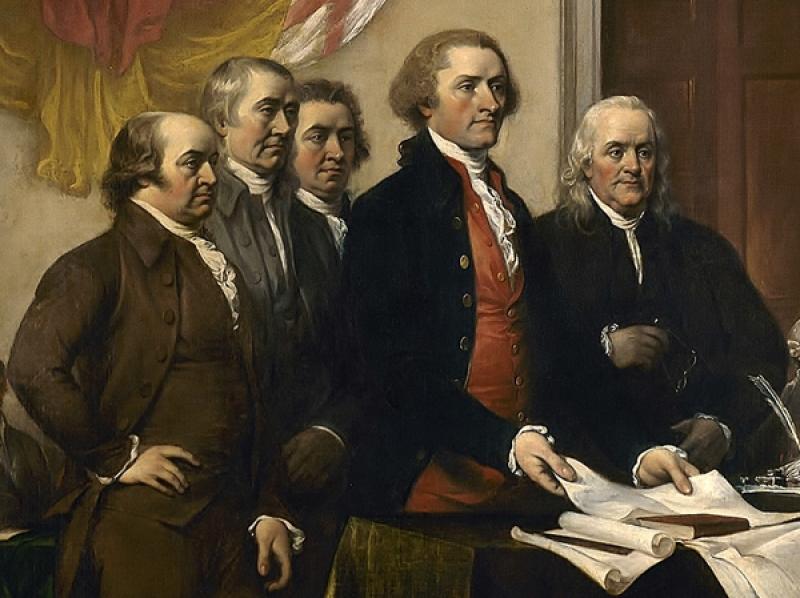'Fears of a Setting Sun' Review: Factions at America's Founding
By: Barton Swaim (WSJ)



As delegates to the Constitutional Convention affixed their signatures to the final document in 1787, Benjamin Franklin fixed his attention on the half-sun carved into the back of the mahogany chair from which George Washington had presided for the previous four months. Franklin remarked (this according to notes taken by James Madison) that painters frequently struggled to distinguish a rising from a setting sun. "I have, often and often, in the course of the session," he said, "and the vicissitudes of my hopes and fears as to its issue, looked at that [sun] behind the president, without being able to tell whether it was rising or setting: but now at length, I have the happiness to know, that it is a rising and not a setting sun."
In "Fears of a Setting Sun: The Disillusionment of America's Founders," Dennis C. Rasmussen, a professor of political science at Syracuse University, uses Franklin's metaphor as the point of departure for an astute discussion of the American founders' suspicions that the republic they had created wouldn't, in the end, make it. The book is gracefully written and fair in its judgments. It's also timely. There must be few news-following Americans who haven't wondered over the last year if the United States can stay united for much longer. The founders, too, worried intermittently about dissolution. Some came to believe it imminent.
To sum up: Washington in his latter years thought parties, or "factions," would tear the country apart. Alexander Hamilton believed, characteristically, that the federal government and especially the executive too anemic to govern so vast a republic. John Adams doubted the people possessed sufficient virtue to make democracy work. Benjamin Rush came to believe the Constitution a hopeless mess and doubted a nation so "bewhiskied" and "bedollared" had much hope. John Marshall was sure the nullification crisis of 1832-33 meant the end. Thomas Jefferson—hitting very near the mark for a man of so many contradictory views—agonized that slavery would tear the country apart. And, alone among the leading founders, the great imperturbable James Madison thought the country would likely do just fine.
Mr. Rasmussen's aim, in part, is to hearten readers inclined to take a bleak view of America's internal prospects. He is aware of the depth of our divisions but counsels against despair. "The looming demise of American democracy has been announced countless times in the course of the nation's history, on each occasion with assurances that this time it really is the end of democracy as we know it," he writes. "We are bombarded with similar pronouncements today."
Yet the framers worried about the failure of the Constitution and the breakup of the republic for the excellent reason that both were, in fact, vulnerable: The new nation had not developed inert political traditions and the presumption of legitimacy that would come later. America in the 2020s is fast losing what it gained over nearly two centuries, as if to return to the self-doubting, fractured state the nation found itself in from about 1790 to 1810.
George Washington’s belief that the American republic might never develop political parties now appears naive. Parties, as Benjamin Disraeli would later put it, are only organized opinion—and opinion must arrange itself somehow. Yet Washington’s worries about the rank partisanship of the 1790s, in which “each side feared catastrophic retrogression at the hands of the other,” in Mr. Rasmussen’s wording, sound strangely familiar to the hate-filled annihilationist politics of our own day.
The first president complained bitterly, for example, of the Democratic Societies, pro-Republican clubs modeled on the Sons of Liberty chapters of the revolutionary years. His criticisms of the societies’ secrecy was tendentious, but his outrage at their rhetoric was justified. Nothing, he wrote in 1794, could “be more absurd—more arrogant—or more pernicious to the peace of Society, than for selfcreated bodies, forming themselves into permanent Censors, & under the shade of Night in a conclave, resolving that . . . this act [of Congress] is unconstitutional—and that act is pregnant of mischief, & that all who vote contrary to their dogmas are actuated by selfish motives, or under foreign influence; nay, are pronounced traitors to their Country.”
Washington was not alone in fearing the worst from partisan enmity. Jefferson noted in 1797—he was Adams’s vice president at the time—that political antipathies were everywhere. “Men who have been intimate all their lives,” he noted, “cross the streets to avoid meeting, and turn their heads another way, lest they should be obliged to touch their hat.”
Jefferson’s specification of hat-wearing men raises an important point: The sharply divided electorate of the 1790s was tiny in relation to that of today, when more or less any non-felon adult can vote. That is as it should be, but one unhappy consequence is that the partisan rancor Washington lamented in the 1790s now grips citizens of both sexes and all social strata. Political rancor is no longer the dysfunction of a tiny political class; it feels more like a societal pathology.
The book’s most perceptive observations—as is usually true in books about the founders—come from the pen of John Adams. His apprehensions about American democracy, in my view, sprang mainly from a problem that had preoccupied the Puritans and, indeed, some writers of the Hebrew Bible: whether virtue can thrive amid prosperity. Hard work and industry create wealth, but wealth encourages idleness and attendant follies. The Puritans solved the problem by the assertion of biblical ideals—moderation, generosity, industry for God rather than carnal satisfactions. Adams, in many ways a lapsed Puritan, offered no solution to the problem but trenchantly diagnosed it.
Fêted in Paris in 1778, he reflected in a letter to Abigail that “stern and hauty Republican as I am . . . I receive but little Pleasure in beholding all these Things, because I cannot but consider them as Bagatelles, introduced, by Time and Luxury in Exchange for the great Qualities and hardy manly Virtues of the human Heart. I cannot help suspecting that the more Elegance, the less Virtue in all Times and Countries.”
Thirty-six years later the problem still agitated him. He thought perhaps war was the only corrective. “Human Nature cannot bear Prosperity,” he wrote to his son John Quincy during the War of 1812. “It invariably intoxicates Individuals and Nations. Adversity is the great Reformer. . . . Prosperity has thrown our dear America into an easy trance for 30 years. The dear delights of Riches and Luxury have drowned all her intellectual and physical Ennergies. But there are symptoms, that the Germ of Virtue is not destroyed. The Root of the matter is Still in us, and alive.” And to his old nemesis, Thomas Jefferson, he asked, in 1819, “Will you tell me, how to prevent riches from becoming the effects of temperance and industry—Will you tell me how to prevent riches from producing luxury—Will you tell me how to prevent luxury from producing effeminacy intoxication extravagance Vice and folly.”
Some reflection on the problem Adams describes might have saved us all a lot of fruitless debates over the alleged disorders of “capitalism.” It isn’t capitalism or any other economic arrangement but prosperity itself that tempts man to indolence and perversity, for the simple reason that man—as all the leading founders understood at some level—is a fallen creature. The only antidote to the sins of idleness, Adams saw, is industry. Modern forms of redistributionism, from socialism on the left to industrial and natalist policies on the right, are powerless to reverse the human condition.
The last founder considered in “Fears of a Setting Sun” is the one who revealed no apprehensions at all of the new republic’s demise. James Madison’s optimism was not the result of his having, as a common appellation has it, “fathered” the Constitution (during the Convention, in fact, he offered many amendments that failed). Madison’s bullishness on the republic arose from the fact, Mr. Rasmussen writes, that “Madison had lower expectations than most of the other founders regarding what was politically possible, and he pointedly refused to let the perfect be the enemy of the good.” Mr. Rasmussen cites Federalist No. 38, in which Madison reasoned that although the 1787 Constitution may contain imperfections, it was vastly superior to the failed Articles of Confederation. “No man would refuse to give brass for silver or gold, because the latter had some alloy in it.”
Mr. Rasmussen takes a similarly buoyant view. “Whatever their political gripes,” he contends, “few Americans would even contemplate jettisoning any of the basic features of the constitutional order: the separation of powers into three branches, the checks and balances among those branches, the bicameral Congress, the division of sovereignty between national and local authorities, the Bill of Rights, and the like.” The constitution, he writes elsewhere, “has rock-solid legitimacy among the American people.”
Among the American people, maybe, but not among the country’s progressive elites. Almost all of the latter would scrap the Electoral College and the Second Amendment tomorrow. Progressives in elective office don’t say so explicitly, but only a fool is unaware of the 21st-century American left’s scorn for the 1787 Constitution. I am not sure how to interpret the New York Times’s 1619 Project, for instance, except as an attempt to disparage and delegitimize the founding documents. The progressive journal Democracy recently published a “new constitution” in which the Senate is stripped of its power to block legislation, states are afforded senators according to population, the Supreme Court is largely relieved of its power to check the legislature, and a rewritten Bill of Rights entitles citizens to “adequate healthcare,” “clean air and water” and “a decent standard of living.”
Some otherwise very smart people, it turns out, would gladly exchange alloyed silver and gold for brass.


